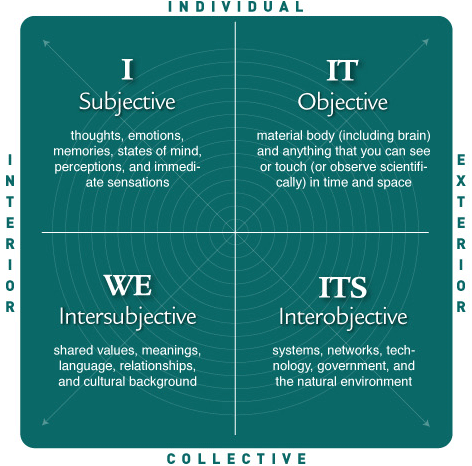Coaching Corner: Four Ways of Being, Which One Are You?
Are you a doer? Or do you feel things first, then act. Perhaps your instinct is to check in with friends. Or do you need the big picture first, then you can make a plan? As an Integral Master Coach™, we seek to identify and help our clients recognize the tendency to orient primarily in one of these four ways-doing, feeling, attending to the group, or attending to the larger system. Let’s look more deeply at these four orientations. Perhaps you’ll see yourself in one of these ways being in the world.
In Integral Theory, the work based on the work of Ken Wilber, there are four primary domains for any occasion. These are often called quadrants, due to their representation in a four quadrant system. These four quadrants are experience, behaviors, culture, and systems, which correspond to individual interior- experience, how do I feel. Individual exterior-behaviors, what I am doing. Interior collective, how am I part of a community or group. And exterior collective, how does the system fit together? With out going into too much detail this graphic from www.integralhealthresources.com gives a nice summary of the four domains or quadrants.
Over time, Joanne Hunt and Laura Divine, the founders of integral Coaching Canada, Inc noticed that folks tend to favor one of these four perspectives. To be clear, that doesn’t mean that we only use one perspective, rather, each person has a habit of attending to one of the four domains more then the others. Learning your habitual way of orienting can be useful in supporting self understanding. Learning how you orient is also helpful when interacting with others, you may begin to see how colleagues or family members favor a way of orienting and this might provide useful information for creating positive outcomes when working with others.
Let’s look more closely. An orientation towards experience: This person attends to her interiors, feelings, values, beliefs. She seeks meaning in situations. She’s aware of thoughts, feelings and sensations as they occur inside and the meaning that goes with them. As she looks at her behaviors, her community and the system, she will attend to how these other domains effect her subjective experience. If you want to know something about her, you have to ask, it’s inside.
An orientation towards behavior: He goes with his body, observable actions, and what he’s doing. He favors objectivity or at least, he’s not always aware of what he feels, rather it’s more about accomplishing action. What he eats, what he says, what activities he chooses to do are the emphasis. He sees the other domains through the lens of action. What can I do with my feelings, what can I do in the group and how does the big picture make room for my plans.
An orientation towards relationships: This is the ‘we’ domain, the part that we share with our family, our culture, shared meaning and language. When he orients from this domain the focus is on fitting together with his colleagues, how he relates to his family, his work, his children. This orientation is concerned with belonging and with the rituals that bind people together. The way to know this perspective is through being in the group. He considers other domains with an attention to his tribe, his behaviors that relate to the collectives and how the shared culture of the we.
An orientation towards the system: She considers her actions in the larger framework. How are we in our environment. What structure needs to be in place in to order to move forward. She considers the larger trajectories of logic and systems such as the lessons of history and the underlying conditions form patterns. She filters her experience, behaviors, and culture back to the map that holds the big picture.
So which are you? Not enough information to tell? Or intuitively you know. There really is no right way to proceed. Just learning to understand yourself and see what that can do for you. For me, I orient towards doing. I tend to measure my days through the actions I take. I forget to pay attention to my feelings.
